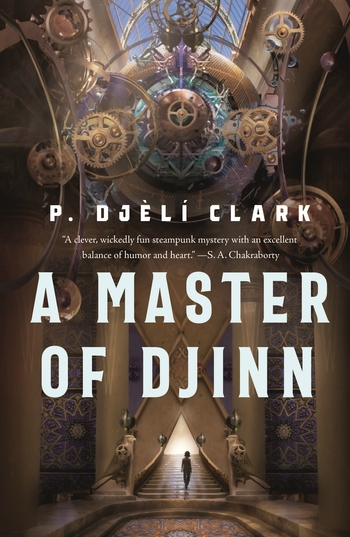Magic shenanigans are the order of the day in this new fantasy novel set in an alternative-universe Cairo
Alternate history—stories of ways the past could have played out differently—ain’t what it used to be. It’s worth a Twitter-mention bloodbath to write a yarn where the Nazis or the Confederacy won out, as some TV writers found out a few years ago after their story of the South winning the civil war got bought (and sunk). “The Man in the High Castle,” an Amazon hit based on Philip K. Dick’s classic novel of a successful Axis, didn’t attract as much controversy, perhaps because the world of the show is such an unadulterated dystopia that it’s hard to charge its creators with sympathy for the Nazis. In any event, writers of alternate history fiction these days tend to find a different kind of historical loser to turn into winners, rather than “tragic” white reactionaries. To do so, they often introduce magic, breathtaking scientific breakthroughs, or other high-concept fare into their worlds. They also partake of other speculative fiction trends that have accompanied the rise of “geek culture” to mainstream prominence.
Exhibit A of this new alternate history can be found in the works of P. Djèlí Clark. A historian working out of the University of Connecticut (he writes under a nom de plume) and a prolific blogger along with being a fiction writer, Clark’s first novel, A Master of Djinn, takes place in the same setting as some of his popular novellas. This is a world where the return of magic in the nineteenth century allowed downtrodden powers such as Haiti and Egypt to turn the tables on colonizers and become great powers in their own right. Egypt in particular becomes a sort of crossroads of magic and technology as well as of great powers old and new. Djinn walk the streets with humans, blimps sail the skies stocked with “clockwork eunuchs” (robots, all very “steampunk”), and everyone is looking to leverage magic and technology for their various ends.
Naturally, such a setting attracts crimes and shady characters, and those who walk among them to protect the public. One such is Fatma, an agent for Egypt’s Ministry of Alchemy, Enchantments, and Supernatural Entities. The remit of the Ministry isn’t made clear—recall, this isn’t the tedious nerdish scifi of yesteryear, but something with a different aesthetic—but Fatma is suave, a snappy dresser and calm under pressure, highly competent but not a dull superwoman. Her remit is being a badass, in the vein of lady badasses that runs from Buffy the Vampire Slayer and assorted comic book and anime heroines.
Fatma’s got a big case on her hands: twenty-something people, mostly English fans of Egyptian antiquity, got burned to death with clear signs of magical involvement. A ceremony gone wrong, “appropriators” of Egypt’s cultural bounty getting theirs, or something bigger? Well, both, and more, and less, as it turns out. The crux of the novel is the threatened return of Al-Jahiz, the Sudanese mystic who first opened the portals that brought magic back into the world. Someone claiming to be him is running around Cairo causing trouble with magic and violence, stirring up the lower classes with nativist/populist rhetoric. Fatma is certain that this character is both responsible for the massacre she’s investigating, and isn’t the real Al-Jahiz, even as evidence piles up pointing to the imposter’s veracity.
Keeping up with all of the twists and turns of A Master of Djinn is beyond the scope of this review, and revealing the villain would spoil some of the fun. In the course of solving the mystery, Fatma does a lot. She breaks in a new agent, the comparatively conservative Muslim woman Hadia, making an unlikely friend. She discovers that her lover and sometime help, lady-heister Siti, hides dangerous secrets. Doors open into the machinations of djinni, angels, and even more powerful magical interdimensional beings. World wars are mooted and we get peeks at what magic looks like elsewhere in the world, like when Kaiser Wilhelm shows up with a goblin advisor on his shoulder. There’s some fun action setpieces and some runaround that occasionally borders on the tedious, especially when what magic can and cannot do—which is to say, how it can aid or impede an investigation—is seldom made clear.
The politics of the recent changes in alternate history world-building and writing don’t need to be belabored too hard, but it’s worth noting here that Clark maintains a blog called “The Musings of a Disgruntled Haradrim,” named after the dark-skinned B-team bad guys in The Lord of the Rings. He actively participates in the foment in science fiction and fantasy circles that seeks to transcend (or anyway, evade) a genre legacy understood as being tied up with racism, sexism, imperialism and assorted other un-progressive “isms.” Scifi and fantasy have been sites of conflict in recent years, where a rising tide of socially-aware works has awoken the ire of nerdish reactionaries, irked by what they see as woke poaching onto the domain of space battles and derring-do. Reactionaries attempted to hijack the Hugo Awards and many a wrist was strained typing angry comments. The progressives decisively won—Boston’s own N.K. Jemison, a black woman and target of horrendous abuse, is the undisputed queen of contemporary scifi/fantasy and won the Hugo for best novel three years running—but the echoes linger.
The funny thing about this conflict, and others that have arisen in nerd-culture spaces lately, is that while the social or political stakes may be high, the literary artistic stakes are not. Scifi reactionaries occasionally complain about contemporary genre offerings being too confusing, but that’s usually a loutish lament when a writer pulls a trick out of the modernist bag, like unreliable narrators or nonlinear storytelling, that should be familiar to any grownup reader, being centuries old and familiar from tv and movies. But beyond increased representation for marginalized groups of all sorts—and in the narrator’s seat, not side characters—there is little formally new on the progressive wing of scifi/fantasy. These are, typically, straight-down-the-middle adventure stories told in straightforward (if sometimes purple, or overly-chatty) prose. The narrators may be LGBTQ or people of color, but they tend to do the usual heroic stuff in the usual heroic way. Harry Potter, comic books, video games, Dungeons and Dragons, and anime are the big influences on both sides of the genre political divide and in terms of story, characterization, and prose, most genre products read more like those things—and each other—than anything else. The progressives are usually a bit better written and edited—think the production qualities on CNN versus those on OANN—but there aren’t radical differences anywhere except ethos.
This dynamic carries over into contemporary alternate history fiction, and into A Master of Djinn. Things are radically different, politically, compared to our world’s 1912 Cairo, but familiar stories play out in familiar ways in familiar prose. History changes, and the rules of reality, but consciousness doesn’t. The best historical novelists, like Marguerite Yourcenar, get across an idea of the past as truly different—that people lived, acted, spoke, and most importantly, thought differently from us—while maintaining an empathic connection to readers who, unavoidably, are bound to the contemporary. Alternate history has a mixed record with this, though the liberation from efforts at historical verisimilitude that Clark’s generation of writers have accomplished should open more doors. At the end of the day, most people read historical fiction and it’s distaff genre cousin alternate history for fun, and A Master of Djinn offers some. One wonders what else it, and other works from the current wave of progressive scifi, could offer if anyone takes up the challenge of getting really weird.
- Djèlí Clark, A Master of Djinn, tor.com, 2021. 400 pp, $27.99
Peter Berard is a writer and organizer who lives in Watertown, MA. For more of his work, check out peterberard.substack.com.


